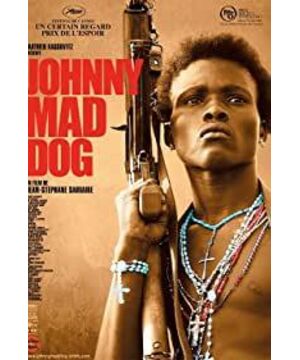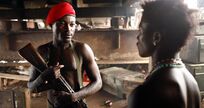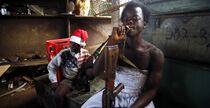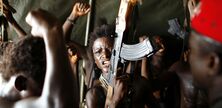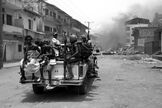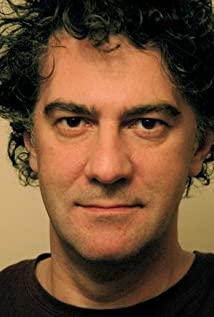Throughout the ages, war exists because of political games, and is a violent means of continuation of political games. In some countries with frequent civil wars, the wars are even more prosperous. The rebel army and the government army, as the two sides facing head-to-head confrontation under the political game, under the banner of "peace, justice, freedom and liberation", with the help of guns and cannonballs in their hands, ruthlessly carried out violence to the end, making their country ravaged by war. People were burned and looted. Under the hail of bullets, the entire country was devastated. Except for the killings, there were only rivers of blood and corpses everywhere.
Due to the complex ethnic relations and the influence of the colonial rule of Western powers, many African countries are constantly at war, so "civil war", "coup d'etat" and "backwardness" have become synonymous with Africa. It seems that it has become a habit and shortcut for war-themed films to compete for awards by recording the sufferings of Africa in a sympathetic manner. "Johnny the Mad Dog", which won the Most Promising Award in the "Un Certain Regard" section of the Cannes Film Festival, is no exception. It is just the African boy who appeared in "Blood Diamond", "Hotel Rwanda", "Under the Uganda Sky" and other films before. Jun, here became the real protagonist.
A group of boy scouts, headed by "Mad Dog" Johnny, live in a poor, backward, war-torn African country.
Before joining the Boy Scouts, they may not be clothed and hungry. Strange outfits - red wigs on their heads, transparent wings, and even a huge tape recorder on their backs, wearing a white wedding dress just revealed that all their clothes were obtained by snatch.
Some of them may have experienced life and death from their relatives at a very young age, some may not even know who their relatives are, and some may not even have names. What's more, some people pulled the trigger with their own hands and witnessed their relatives being pierced through the skull by a cold and hot bullet, and they fell in a pool of blood. Here, they have never had the freedom to control their own lives, only the helplessness of succumbing to the muzzle of a gun. Forced to join the Boy Scouts, they were driven into battle, on the edge of hell, licking blood at gunpoint.
"You don't want to die!"
"Don't be born!"
The so-called "commander", the "Never Die" general, captured the will of the Boy Scouts with a few simple and crude slogans, instilled violent beliefs into them, and placed them in the chaos of war. The environment naturally shaped them into killing tool. For Boy Scouts, with a gun in hand, anything is possible! They gradually understood that only by becoming the master of the people can they have the right to enjoy freedom. Therefore, under the banner of justice and freedom, they wantonly shoot, kill, rape and loot the people.
They carried gun barrels that were almost the same height as themselves, screaming and clamoring frantically, like a rabble. At the age when they should be educated in school, they have hardly received any education. Fate left them with no choice but to roll, struggle, and survive in the flames of war. Behind the war lies the brutality of human nature. The young boy scouts carry guns to the battlefield, subtly and gradually become "crazy" executioners.
Under the leadership of Johnny, the Boy Scouts robbery and loot everywhere, and the city is full of gunpowder.
Raising the barrel of the gun in his hand, he fired a random shot at the car, blood splattered on the window, dragged the corpse out of the car, and the truck became their means of transportation. Intending to capture a pig, "no good idea" aimed the gun at the old man, projected the robbery behavior on the old man, forcibly took away the old man's pig, and rationalized his own behavior at the same time. Faced with a boy who described the orange as a banana under the threat of survival, they magnified a slip of the tongue, probably due to fear and tension, for no reason, thinking that the boy was a government army, shooting and killing him. . If you want to add a crime, why worry!
The Boy Scouts led by Johnny shouted the slogans of justice and liberation, held high the banner of peace and freedom, the desire to survive gave them indifferent eyes, the gun in their hands gave them the right to wantonly burn, kill and loot, and the violent and barbaric society gave them Crazy humanity!
Whether it's "Mad Dog" Johnny, "No Good Ideas", or "Butterfly", everyone in the Boy Scouts is essentially the same as ordinary people, all of them struggling to survive in poverty, misery and war. member. The only difference between them is whether or not they have tools.
The guns in the hands of the Boy Scouts are the shields to protect themselves, the capital that runs rampant, and the source of power grabbing! Without guns, they are just like ordinary people, no difference. The Boy Scouts, who were struggling with blood at the muzzle of the gun, gradually understood that the gun in their hands made them the masters of their own destiny, whether it was their own or that of the common people. As everyone knows, they have already become slaves to the guns in their hands. When they pulled the trigger, the bullet penetrated the head of the "enemy", the blood splashed was the swan song of life, the clamor was the madness of survival, the numb emotion flashed on the face, the heart was hot It's the mark of killing.
This forces us to rethink the nature of tools. Once a tool is invented, it is put into use immediately. Over time, it grows on the user's body like an organ and becomes an indispensable part of the body. When we use tools, we enjoy both the benefits and the limitations they bring. We often misunderstand that tools are passive and people are active. In fact, it is not. People have invented all kinds of tools, and tools also shape people in the process of using them.
When a craftsman picks up a hammer, the hammer becomes part of the hand. At this time, the function of the hand is limited by the hammer, and it can only do what the hammer can do—pull nails, nail nails.
When a soldier picks up a telescope, the telescope becomes part of the eye. At this time, the only thing the eyes can see is the distance, and the field of vision becomes farther, but everything around them is blinded.
When Boy Scouts pick up the barrel of a gun, the barrel becomes part of their body. At this time, everyone they saw was the enemy, and all they could do was to use the guns in their hands to intimidate, shoot, and kill.
What kind of tool you have in your hand, what kind of world you have in your eyes. The role and connection between people and tools are mutual. When tools become the extension of people to transform the world, people also become the extension of tools. The longer a tool is used, the more its form and function affect the user.
Under the violent struggle, the strong survive and the weak die is an inevitable trend. Those in power behind the scenes gave the Boy Scouts a tool, the gun, making them relatively powerful. Driven by the desire to survive, they make the best use of the guns in their hands - insulting, beating, robbing, killing, mercilessly enslaving the poor and defenseless, and unleashing their desire to conquer. They struggled to survive like wild beasts, and the guns became their tool for profiting from the blood of the people, and it became their only means of survival.
Gun barrels are the Boy Scouts' tools to conquer and enslave the people, and they also dominate the Boy Scouts' destiny. While using the tools, they themselves have become tools for the political game of the power-holders behind the scenes. Once they lose their use value, they will inevitably be abandoned. If the rebels enslaved the Boy Scouts' bodies and captured their will, then the guns enslaved their humanity. Hidden behind the crazy humanity of the Boy Scouts are instrumentalized people, the sadness of children under the political game of this era.
Compared with adult soldiers, Boy Scouts do not fully understand the rules of war survival and death, and it is easy to capture their will, and they will more blindly obey orders. The repeated shouting of a few simple and crude slogans, more precisely a ritual, followed by applying cocaine to the wounds of the Boy Scouts, allowing it to penetrate directly into the bloodstream, without hunger or sleep, instilling violence and Immortal Faith. Without the fear of death, the Boy Scouts took the brunt of being the vanguard, removing all obstacles for the rebels, and at the same time transforming into icy killing machines.
In stark contrast to the icy killing machine, among the refugees on the run from the Boy Scouts, is a girl named Laukore, who seems to be a symbol of hope in the film. After experiencing the grief of losing a loved one, walking alone on the streets full of bullets, looking for his lost brother, he still holds a glimmer of hope. However, her only remaining humanity, in addition to bringing some self-comfort in despair, appears pale and powerless in the cruel reality of war.
Lauclay briefly exchanged glances with Johnny in the abandoned building after witnessing the Boy Scouts slaughter the little boy. Surprisingly, Johnny did not raise the barrel of the gun in his hand. Has Lau Kelai's appearance awakened a trace of humanity left in Johnny's heart? This seems too easy. After all, the little girl is not God, her eyes contain strength, bravery, and kindness, but it does not mean that miracles will happen.
At the end of the film, facing Laukore, Johnny intends to conquer her as he rapes any other woman. Unexpectedly, Lau Kelay resisted. She grabbed the barrel of Johnny's gun, raised it without hesitation, aimed it at Johnny's temple, and slammed it down! One, two...until Johnny begged for mercy. Lau Kelai pointed the gun at him and shed tears silently...
The movie is over at this point, and the ending can be said to be unfinished and meaningful.
I believe that most people will think that the little girl Lau Corey, who is regarded as a symbol of hope, did not give in in the final confrontation with Johnny, representing that the barbaric and violent Johnny was finally brought down, and the seed of hope was not annihilated by war , the future is bright. It's one of the few bright spots in the entire movie.
actually not! The ending of the film reveals the last glimmer of hope in the annihilation of the war.
Almost throughout the film, the little girl appears in a positive image of hope. In the process of fleeing, she witnessed the ruthless sniping by the Boy Scouts, experienced the separation of life and death from her relatives, and the war brought her a nightmarish life. The desire for peace can only come from the heart and end in action. When she met Johnny again, she was not afraid to confront him, believing that Johnny was the one who caused her and all the ordinary people to be destroyed. In the face of Johnny's coercion and temptation, she showed unusual calmness. Such calmness is highly unusual for a fleeing, captured refugee, despite her strength and bravery in the midst of war. Behind this calm, an undercurrent that is ready to move is condensing, waiting to break out. Sure enough, when Lau Kelai snatched the barrel of Johnny's gun, the strength and bravery in his eyes disappeared, replaced by anger, hatred, and indifference. She knew that she could not stop the war, and blamed the disaster brought by the war to the people in front of Johnny. Driven by anger, she released the hatred and anger towards the war in her heart, and slammed the barrel of the gun on Johnny. !
At this moment, Johnny, who fell to the ground begging for mercy, was very different from his previous image of sweeping around with the barrel of a gun and running rampant. Without the barrel of the gun, Johnny is only a member of the common people. He has lost his domineering capital. What awaits him at the moment is the helplessness of his life being terminated; on the other hand, Lau Kelay, who is holding the barrel of the gun, after beating Johnny, raised it. The barrel of the gun was pointed at him, like a violent terminator. It was the tools in their hands that made them so different from their previous images. If you want to survive in the chaos of war, you must first have the right to dominate your destiny, and at this time, only the barrel of a gun can dominate your destiny. Whoever has the right to use the gun has the right to speak!
If the little girl is a symbol of peace, humanity and hope in war, then the moment she picked up the gun in her hand, the hope was drowned out by the invisible smoke of war; when she smashed the gun into Johnny, The so-called peace has been broken by her own hands; when she raises the barrel of her gun at Johnny, once she pulls the trigger, she becomes the next "Johnny"! This is also the true meaning of her last tears-peace is only a distant fantasy, only by surviving in war can you be qualified to talk about peace; to control violence with violence means that you will become the next user of violence, although The targets of violence are different, but the essence of using violence to achieve survival goals is surprisingly consistent.
"Johnny Mad Dog" refers not only to Johnny, the boy scout leader in the movie, but also to a group of people who rely on the tools in their hands to survive in the war. Its "madness" is reflected in the exchange of another life for the chance to survive, whether it is killing innocent people or killing violent leaders. Once the bullet is fired, there is no turning back. "Johnny the Mad Dog" started out by taking one life with his own hands and ended up being ended by another. This may be the "immortality" belief instilled in the Boy Scouts by General "Never Die". "Johnny the Mad Dog" cannot be killed. Killing one Johnny will give birth to another Johnny. The cycle of life and death will never end.
Blindly praying for peace in war is obviously unrealistic, and only fighting violence with violence is the only way to survive in war. This is exactly what the ending of the film reflects. Peace is just a good wish in war, and human nature is nothing but an illusory hope. Especially in poor and backward countries with frequent civil wars, only those with guns and those targeted by guns will either kill another life to protect themselves, or they will be killed and their lives will end.
What "Johnny Mad Dog" shows us is not the only hope left in the war, but the helplessness that the last hope is gradually annihilated in the war. The blood baptism under the violent struggle has not taken away the poverty and suffering of the country. The suffering country is still suffering, and the crazy humanity is even more crazy.
View more about Johnny Mad Dog reviews


